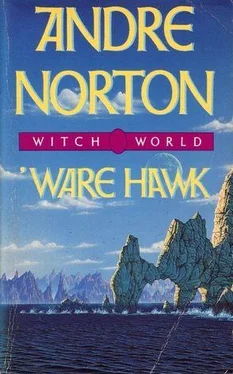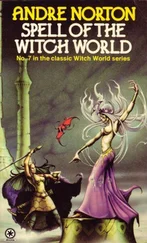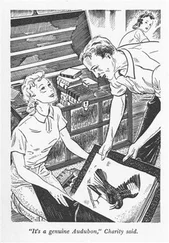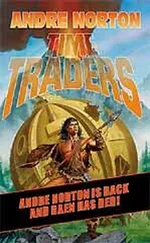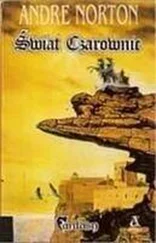Andre Norton - Ware Hawk
Здесь есть возможность читать онлайн «Andre Norton - Ware Hawk» весь текст электронной книги совершенно бесплатно (целиком полную версию без сокращений). В некоторых случаях можно слушать аудио, скачать через торрент в формате fb2 и присутствует краткое содержание. Жанр: Фэнтези, на английском языке. Описание произведения, (предисловие) а так же отзывы посетителей доступны на портале библиотеки ЛибКат.
- Название:Ware Hawk
- Автор:
- Жанр:
- Год:неизвестен
- ISBN:нет данных
- Рейтинг книги:4 / 5. Голосов: 1
-
Избранное:Добавить в избранное
- Отзывы:
-
Ваша оценка:
- 80
- 1
- 2
- 3
- 4
- 5
Ware Hawk: краткое содержание, описание и аннотация
Предлагаем к чтению аннотацию, описание, краткое содержание или предисловие (зависит от того, что написал сам автор книги «Ware Hawk»). Если вы не нашли необходимую информацию о книге — напишите в комментариях, мы постараемся отыскать её.
Ware Hawk — читать онлайн бесплатно полную книгу (весь текст) целиком
Ниже представлен текст книги, разбитый по страницам. Система сохранения места последней прочитанной страницы, позволяет с удобством читать онлайн бесплатно книгу «Ware Hawk», без необходимости каждый раз заново искать на чём Вы остановились. Поставьте закладку, и сможете в любой момент перейти на страницу, на которой закончили чтение.
Интервал:
Закладка:
They could not remain here. The raiders had gone, yes, but that did not mean that their own small party might not be sighted. There was nowhere she might deliver what she held into safety; she must take the fear-bound child with her. For all her cultivated hardness, Tirtha recognized that truth.
The Falconer dropped his hand to the butt of his dart gun. Now the bird took off in the sky. Tirtha’s uneasiness at remaining was obviously shared.
“There is no place for…” She indicated what she held. “We must take it with us.”
She half expected a protest. Falconers knew nothing of children. They did not even own those they fathered. In their villages of women, men impregnated selected females, perhaps several of them, within a stated time, but they were never true fathers. When they were six, the male children went into the Eyrie, or they had in the old days—to be housed apart, trained by selected fighters who were old or maimed and unable to serve in the field. They had no true childhood, and it would seem that the custom served their way of life adequately. To be saddled not only with a child, but one invisible and perhaps catatonic, would be an experience none of his kind had faced before.
Yet he made no comment, only went for Tirtha’s mare, bringing the pony to her. She loosed the throat latch of her cloak, wrapped its folds about the limp body of the child. She passed the bundle to the Falconer, mounted to accept it back. Then, with nearly the same speed with which they had come, they re-crossed the field to pass by the ruins. To bury the dead—she nearly checked her horse by that other small body, then realized that her first charge was the child she carried and that their own safety might depend upon a swift withdrawal.
Back they rode into the forested hills; again the Falconer led. They went more slowly, while he took the precautions of the hunted, dismounting at times to draw a leafed branch over ground where they had left too plainly marked a trail, winding a way that took every advantage of the nature of the country and any cover offered.
The falcon made periodic flights, reporting back at intervals. Though the man did not translate for her any messages it brought, Tirtha guessed that they were in no immediate danger from any other travelers in this land.
In her hold the child lay unmoving, inert. She tried at intervals to break through the mind barrier terror had set, longing fiercely to know more, have the ability to help. There was, she feared, a very good chance that if the conscious mind was lost forever, the will to live might follow. Death would then ensue. Such an end might be merciful, but she knew she would fight for this life with all her strength.
They reached a place before noon that the Falconer appeared to believe spelled safety for a while, and there they halted. There was no water, but a tough growth of grass satisfied the ponies and the Torgian. There was a half-shelter formed by some rocks to conceal them from any but the most intent search.
Tirtha sat, holding the child across her knees. The small body, still invisible, which had felt so cold when she had first taken it up, was now warm—too warm. Her cautious hand brushed aside fine, sweat-dampened hair to rest on a forehead where fever heat burned. She located a small mouth, which hung a little open, was able to dribble into it some water from her saddle bottle. There came a faint gulping noise, the first hopeful sign she had received, and she eagerly gave her charge another drink.
At the same time her mind was busy. To break an ensorcellment as strong as this—no, she had not the power. On the other hand there were spells of the shape-changing kind that possessed their own time limit. She gritted her teeth against hot, hard words she had learned in her tramping, which could be a release for her frustration and anger.
Having done what he could to establish their camp, the Falconer returned to squat on his heels beside her, pulling off his helm as if he felt his sight too limited by its half-mask.
“What holds it so?” he asked.
“Illusion, I think.” She could be sure of nothing. “It could have been carried there for hiding—you saw the tracks in the field—they were hunting someone. A mother might have possessed some talent. If she feared enough, she could have cast a spell to cover a child, hidden it away, even allowed herself to be taken…”
“Those now of Karsten have no witchery,” he pointed out. “And the Old Race…”
“…were long since damned and doomed here, yes. But that is not to say that some of the old stock could not have remained in hiding. Also, we can wed with others and prove fruitful. Some of us have mated with the Sulcars who have no witchery in them, their power lying in their sea knowledge only. There is also Simon Tregarth, the outlander. He bedded with one of the Wise Council. They outlawed her for it, saying she was none of them but a traitor to their beliefs. Yet it is true that he had something of the talent, and neither did she lose hers for being wedded as they had sworn she would.
“Three children she had at one birthing, which was never known before. And all three have the Power—still have—for it is they who, they say, now lead the war in Escore and have opened that land again to the Old Race.
“Thus it could be that one of my blood bred half kin here, who had talent. If that lies within one, then it can be summoned when the need is great. Still…” She paused.
“Still—?” he persisted.
“Even Lormt held no such secret as this. No”—she shook her head vigorously—“I am of the Old Race, but I have very little talent. I am a healer of sorts, and I can use the vision-seeing. That is the best of my learning. As you know, I can sense life essence and communicate with animals after a limited fashion. But all that I know or have heard of illusion is that it must be summoned by ritual, and that is not done swiftly or with ease. I do not see how one pursued, as those tracks showed, could have so wrought to hide this child in that way.”
“Then how else—?”
She had considered that all morning, striving to fit this and that answer to the same question. What was left was only a suspicion and one that seemed near impossible to believe, though she had long ago learned that the world was full of strange and awe-filling things.
“The child itself,” Tirtha replied slowly. “In Estcarp, girl children were tested early—sometimes when they were no more than five or six. The power can be recognized even at so small a score of years. Here in Karsten there would be no such recognition. Suppose a child of the full old blood—even of mixed blood—was born with full power. Such a one might see the world differently from the way we view it, and that early enough so that it would learn to hide what it was and what power was in it or be taught to so hide it by one close to it. There would be no formal training, but if danger—fear—were great enough, that fear in itself might open a door to the full talent, such as comes usually only after a long training.
“Uncontrolled, frightened by great terror, then a child’s instinct for survival might react as a protection, overriding the need for ritual that a trained Witch or Wise One would have as a barrier to betrayal through their own emotions.”
He nodded. “What you have reasoned sounds sensible. I know little of witchery. But fear which is strong enough can give a man physical strength past his own potential; this I have seen. The will, which is the inner core of a man, if it is determined, can lead him to accomplish more than his fellows would believe possible. Given this talent you speak of and fear great enough—yes—it might be so. But if that is the truth, how can we then help? Is this one so lost within itself that it cannot be summoned forth again?”
Читать дальшеИнтервал:
Закладка:
Похожие книги на «Ware Hawk»
Представляем Вашему вниманию похожие книги на «Ware Hawk» списком для выбора. Мы отобрали схожую по названию и смыслу литературу в надежде предоставить читателям больше вариантов отыскать новые, интересные, ещё непрочитанные произведения.
Обсуждение, отзывы о книге «Ware Hawk» и просто собственные мнения читателей. Оставьте ваши комментарии, напишите, что Вы думаете о произведении, его смысле или главных героях. Укажите что конкретно понравилось, а что нет, и почему Вы так считаете.
